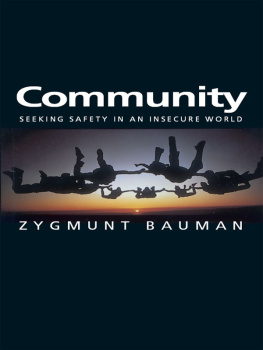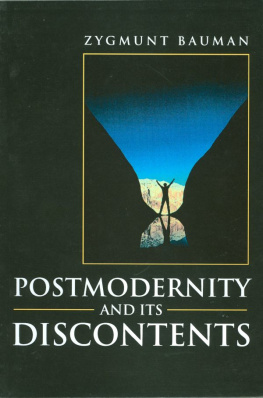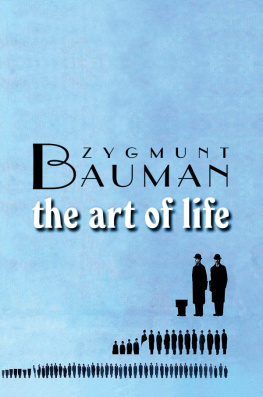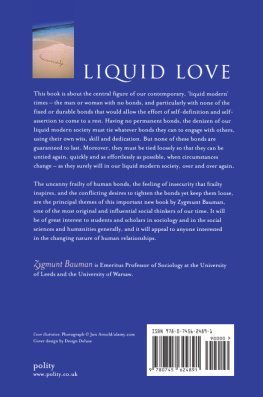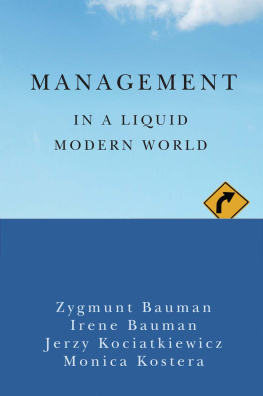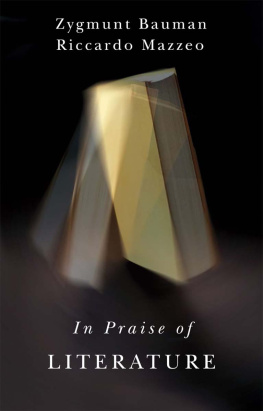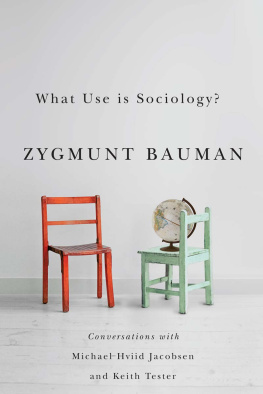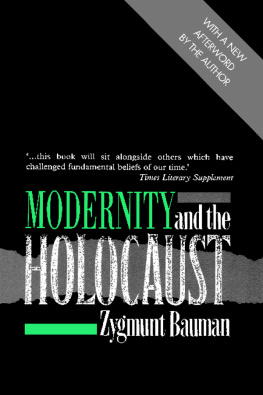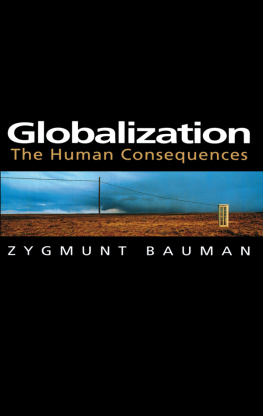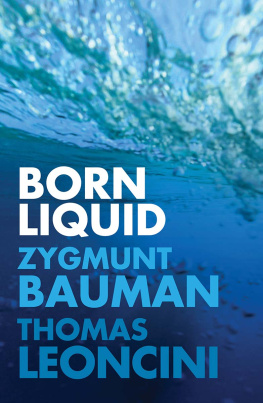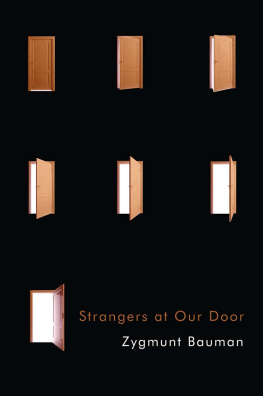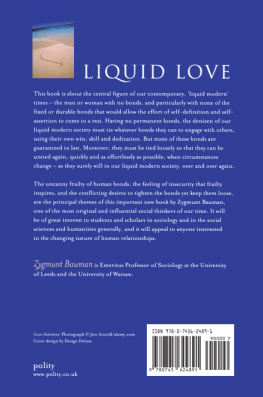Bauman - Community: seeking safety in an insecure world /Zygmunt Bauman
Here you can read online Bauman - Community: seeking safety in an insecure world /Zygmunt Bauman full text of the book (entire story) in english for free. Download pdf and epub, get meaning, cover and reviews about this ebook. City: Oxford, year: 2001, publisher: Wiley;Polity Press, genre: Politics. Description of the work, (preface) as well as reviews are available. Best literature library LitArk.com created for fans of good reading and offers a wide selection of genres:
Romance novel
Science fiction
Adventure
Detective
Science
History
Home and family
Prose
Art
Politics
Computer
Non-fiction
Religion
Business
Children
Humor
Choose a favorite category and find really read worthwhile books. Enjoy immersion in the world of imagination, feel the emotions of the characters or learn something new for yourself, make an fascinating discovery.
Community: seeking safety in an insecure world /Zygmunt Bauman: summary, description and annotation
We offer to read an annotation, description, summary or preface (depends on what the author of the book "Community: seeking safety in an insecure world /Zygmunt Bauman" wrote himself). If you haven't found the necessary information about the book — write in the comments, we will try to find it.
Community: seeking safety in an insecure world /Zygmunt Bauman — read online for free the complete book (whole text) full work
Below is the text of the book, divided by pages. System saving the place of the last page read, allows you to conveniently read the book "Community: seeking safety in an insecure world /Zygmunt Bauman" online for free, without having to search again every time where you left off. Put a bookmark, and you can go to the page where you finished reading at any time.
Font size:
Interval:
Bookmark:
THEMES FOR THE 21ST CENTURY
Titles in this series
Zygmunt Bauman, Community: Seeking Safety in an
Insecure World
Zygmunt Bauman, Globalization: The Human Consequences
Norberto Bobbio, Left and Right: The Significance of a
Political Distinction
Alex Callinicos, Equality
Diane Coyle, Governing the World Economy
Andrew Gamble, Politics and Fate
Paul Hirst, War and Power in the 21st Century
James Mayall, World Politics: Progress and its Limits
Ray Pahl, On Friendship
Forthcoming
Richard Falk, Killer Technologies
Joni Lovenduski, The Misrepresentation of Women
Shaun Riordan, Diplomacy
Insecure World
Copyright Zygmunt Bauman 2001
The right of Zygmunt Bauman to be identified as author of this work has been
asserted in accordance with the Copyright, Designs and Patents Act 1988.
First published in 2001 by Polity Press in association with Blackwell Publishing Ltd
Reprinted 2001, 2002, 2003, 2004 (twice), 2006, 2007, 2008
Polity Press
65 Bridge Street
Cambridge CB2 1UR, UK
Polity Press
350 Main Street
Maiden, MA 02148, USA
All rights reserved. Except for the quotation of short passages for the purposes of criticism and review, no part of this publication may be reproduced, stored in a retrieval system, or transmitted, in any form or by any means, electronic, mechanical, photocopying, recording or otherwise, without the prior permission of the publisher.
Except in the United States of America, this book is sold subject to the condition that it shall not, by way of trade or otherwise, be lent, re-sold, hired out, or otherwise circulated without the publishers prior consent in any form of binding or cover other than that in which it is published and without a similar condition including this condition being imposed on the subsequent purchaser.
ISBN 978-0-7456-2634-5
ISBN 978-0-7456-2635-2 (pbk)
A catalogue record for this book is available from the British Library and has been applied for from the Library of Congress.
Typeset in 10.5 on 12 pt Plantin by SetSystems Ltd, Saffron Walden, Essex
Printed in United States by Odyssey Press Inc., Gonic, New Hampshire
This book is printed on acid-free paper.
For further information on Polity, visit our website http://www.polity.co.uk
to Elusive Community
Words have meanings: some words, however, also have a feel. The word community is one of them. It feels good: whatever the word community may mean, it is good to have a community, to be in a community. If someone wandered off the right track, we would often explain his unwholesome conduct by saying that he has fallen into bad company. If someone is miserable, suffers a lot and is consistently denied a dignified life, we promptly accuse society the way it is organized, the way it works. Company or society can be bad; but not the community. Community, we feel, is always a good thing.
The meanings and feelings the words convey are not, of course, independent of each other. Community feels good because of the meanings the word community conveys all of them promising pleasures, and more often than not the kinds of pleasures we would like to experience but seem to miss.
To start with, community is a warm place, a cosy and comfortable place. It is like a roof under which we shelter in heavy rain, like a fireplace at which we warm our hands on a frosty day. Out there, in the street, all sorts of dangers lie in ambush; we have to be alert when we go out, watch whom we are talking to and who talks to us, be on the look-out every minute. In here, in the community, we can relax we are safe, there are no dangers looming in dark corners (to be sure, hardly any corner here is dark). In a community, we all understand each other well, we may trust what we hear, we are safe most of the time and hardly ever puzzled or taken aback. We are never strangers to each other. We may quarrel but these are friendly quarrels, it is just that we are all trying to make our togetherness even better and more enjoyable than it has been so far and, while guided by the same wish to improve our life together, we may disagree how to do it best. But we never wish each other bad luck, and we may be sure that all the others around wish us good.
To go on: in a community we can count on each others good will. If we stumble and fall, others will help us to stand on our feet again. No one will poke fun at us, no one will ridicule our clumsiness and rejoice in our misfortune. If we do take a wrong step, we can still confess, explain and apologize, repent if necessary; people will listen with sympathy and forgive us so that no one will hold a grudge forever. And there will always be someone to hold our hand at moments of sadness. When we fall on hard times and we are genuinely in need, people wont ask us for collateral before deciding to bail us out of trouble; they wont be asking us how and when will we repay, but what our needs are. And they will hardly ever say that helping us is not their duty and refuse to help us because there is no contract between us obliging them to do so, or because we failed to read the small print of the contract properly. Our duty, purely and simply, is to help each other, and so our right, purely and simply, is to expect that the help we need will be forthcoming.
And so it is easy to see why the word community feels good. Who would not wish to live among friendly and well-wishing people whom one could trust and on whose words and deeds one could rely? For us in particular who happen to live in ruthless times, times of competition and one-upmanship, when people around seem to keep their cards close to their chests and few people seem to be in any hurry to help us, when in reply to our cries for help we hear admonitions to help ourselves, when only the banks eager to mortgage our possessions are smiling and wishing to say yes, and even they only in their commercials, not in their branch offices the word community sounds sweet. What that word evokes is everything we miss and what we lack to be secure, confident and trusting.
In short, community stands for the kind of world which is not, regrettably, available to us but which we would dearly wish to inhabit and which we hope to repossess. Raymond Williams, the thoughtful analyst of our shared condition, observed caustically that the remarkable thing about community is that it always has been. We may add: or that it is always in the future. Community is nowadays another name for paradise lost but one to which we dearly hope to return, and so we feverishly seek the roads that may bring us there.
Paradise lost or a paradise still hoped to be found; one way or another, this is definitely not a paradise that we inhabit and not the paradise that we know from our own experience. Perhaps it is a paradise precisely for these reasons. Imagination, unlike the harsh realities of life, is an expanse of unbridled freedom. Imagination we can let loose, and we do, with impunity since we have not much chance of putting what we have imagined to the test of life.
It is not just the harsh reality, the admittedly noncommunal or even the explicitly community-hostile reality, that differs from that imagined community with a warm feel. That difference, if anything, only spurs our imagination to run faster and makes the imagined community even more alluring. On this difference, the imagined (postulated, dreamed of) community feeds and thrives. What spells trouble for the cloudless image is another difference: that between the community of our dreams and the really existing community: a collectivity which pretends to be community incarnate, the dream fulfilled, and (in the name of all the goodness such community is assumed to offer) demands unconditional loyalty and treats everything short of such loyalty as an act of unforgivable treason. The really existing community, were we to find ourselves in its grasp, would demand stern obedience in exchange for the services it renders or promises to render. Do you want security? Give up your freedom, or at least a good chunk of it. Do you want confidence? Do not trust anybody outside your community. Do you want mutual understanding? Dont speak to foreigners nor use foreign languages. Do you want this cosy home feeling? Fix alarms on your door and TV cameras on your drive. Do you want safety? Do not let the strangers in and yourself abstain from acting strangely and thinking odd thoughts. Do you want warmth? Do not come near the window, and never open one. The snag is that if you follow this advice and keep the windows sealed, the air inside would soon get stuffy and in the end oppressive.
Font size:
Interval:
Bookmark:
Similar books «Community: seeking safety in an insecure world /Zygmunt Bauman»
Look at similar books to Community: seeking safety in an insecure world /Zygmunt Bauman. We have selected literature similar in name and meaning in the hope of providing readers with more options to find new, interesting, not yet read works.
Discussion, reviews of the book Community: seeking safety in an insecure world /Zygmunt Bauman and just readers' own opinions. Leave your comments, write what you think about the work, its meaning or the main characters. Specify what exactly you liked and what you didn't like, and why you think so.

